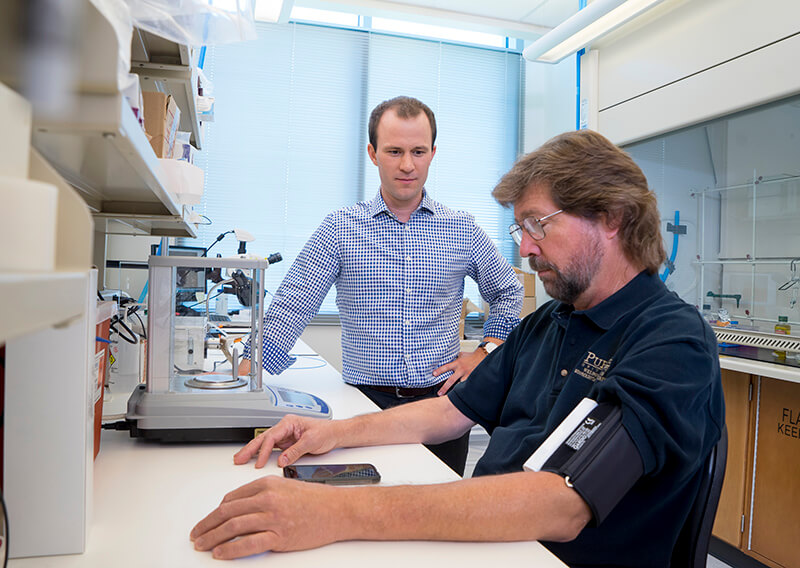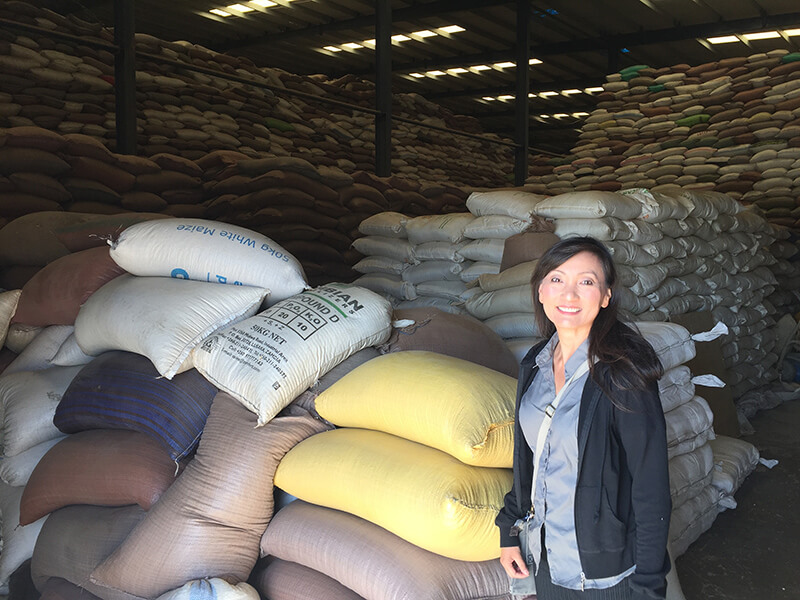November 14, 2017
Purdue researchers receive ‘Grand Challenges Explorations’ grant for projects to help expecting mothers
 Craig Goergen, assistant professor in the Weldon School of Biomedical Engineering, and Kirk Foster, senior research engineer, test wearable technology to detect, monitor and treat preeclampsia in pregnant women. (Photo/Vincent Walter)
Download image
Craig Goergen, assistant professor in the Weldon School of Biomedical Engineering, and Kirk Foster, senior research engineer, test wearable technology to detect, monitor and treat preeclampsia in pregnant women. (Photo/Vincent Walter)
Download image
WEST LAFAYETTE, Ind. — Purdue University announced Tuesday (Nov. 14) that it is a Grand Challenges Explorations winner, an initiative funded by the Bill & Melinda Gates Foundation.
Two College of Engineering professors will pursue innovative global health and development research projects. Craig Goergen, assistant professor in the Weldon School of Biomedical Engineering is working on a project titled “wearable low-cost automated supine pressor test for prediction of preeclampsia,” while Yuehwern Yih, a professor in the School of Industrial Engineering, is undertaking a project titled “demand sensing and digital tracking for maternal and child health in Uganda.”
Grand Challenges Explorations supports innovative thinkers worldwide to explore ideas that can break the mold in how we solve persistent global health and development challenges. The Yih and Goergen projects are two of 51 Grand Challenges Explorations Round 19 grants announced Tuesday by the foundation.
To receive funding, Yih, Goergen and other Grand Challenges Explorations winners demonstrated in a two-page online application a bold idea in one of four critical global heath and development topic areas. The foundation will be accepting applications for the next GCE round in February.
 Yuehwern Yih, a professor in the School of Industrial Engineering, stands in a warehouse where she was working on a supply chain project. (Photo/School of Industrial Engineering)
Download image
Yuehwern Yih, a professor in the School of Industrial Engineering, stands in a warehouse where she was working on a supply chain project. (Photo/School of Industrial Engineering)
Download image
“We are excited about the global impact of Professor Goergen and Professor Yih’s research at the intersection of engineering and health care,” said Mung Chiang, the John A. Edwardson Dean of the College of Engineering. “The visionary support from the Bill & Melinda Gates Foundation will enable these outstanding researchers in biomedical engineering and industrial engineering to develop new solutions for many people’s lives in developing countries.”
For Goergen’s team, the challenge was developing wearable technology to improve the health of a mother and her unborn child that can be used in low-resource settings. The answer: Combining smart phone technology with a blood pressure cuff and body-position accelerometer to detect, monitor and treat preeclampsia.
The new combination takes a pregnant mother’s blood pressure while lying on her side and then on her back to assess kidney blood flow, and then the device relays the data to physicians. This allows patients in a remote setting to be better monitored in case a pregnant woman is at risk to develop preeclampsia, a pregnancy disorder characterized by high blood pressure.
Also involved from Purdue are Kirk Foster, senior research engineer, and George Wodicka, the Dane A. Miller Head of the Weldon School of Biomedical Engineering. Dr. David Reuter, a Beering Fellow and Purdue alumnus and board-certified pediatrician at Seattle Children’s Hospital with more than 20 years’ experience as a physician/innovator with expertise in preeclampsia, is providing key clinical insight.
Yih’s team is working to save the lives of mothers giving birth by developing a better, more efficient supply system for essential medications and supplies.
The project will gather critical supply data – now kept in registries on index card-sized stock cards – and do targeted transformations into electronic form that can be used for predicting models and managing the supply chain, which is a lengthy process going from local hospitals to the district supplier and then to the national store.
Also involved are Seokcheon Lee, associate professor of industrial engineering; Paul Griffin, St. Vincent Health Chair of Healthcare Engineering, director of Regenstrief Center for Healthcare Engineering and professor of industrial engineering; MD Munirul Haque, research scientist for Regenstrief Center for Healthcare Engineering; and Andrea Burniske, program manager of innovation for the Office of Global Engineering Program’s International Development Laboratory.
ResilientAfrica Network (RAN) and Management Sciences for Health (MSH) also are collaborating in the project.
This is the second consecutive year that College of Engineering faculty earned an award from the Gates Foundation. Jacqueline Linnes, an assistant professor in the Weldon School of Biomedical Engineering, is pursuing an innovative project aimed at developing a low-cost technology similar to a pregnancy test for detecting HIV infection.
About Grand Challenges Explorations
Grand Challenges Explorations is a $100 million initiative funded by the Bill & Melinda Gates Foundation. Launched in 2008, over 1,365 projects in more than 65 countries have received Grand Challenges Explorations grants. The grant program is open to anyone from any discipline and from any organization. The initiative uses an agile, accelerated grant-making process with short two-page online applications and no preliminary data required. Initial grants of $100,000 are awarded two times a year. Successful projects have the opportunity to receive a follow-on grant of up to $1 million.
Writer: Brian L. Huchel, 765-494-2084, bhuchel@purdue.edu
Sources: Mung Chiang, 765-494-5346, chiang@purdue.edu
Yuehwern Yih, 765-494-0826, yih@purdue.edu
Craig Goergen, 765-494-1517, cgoergen@purdue.edu
